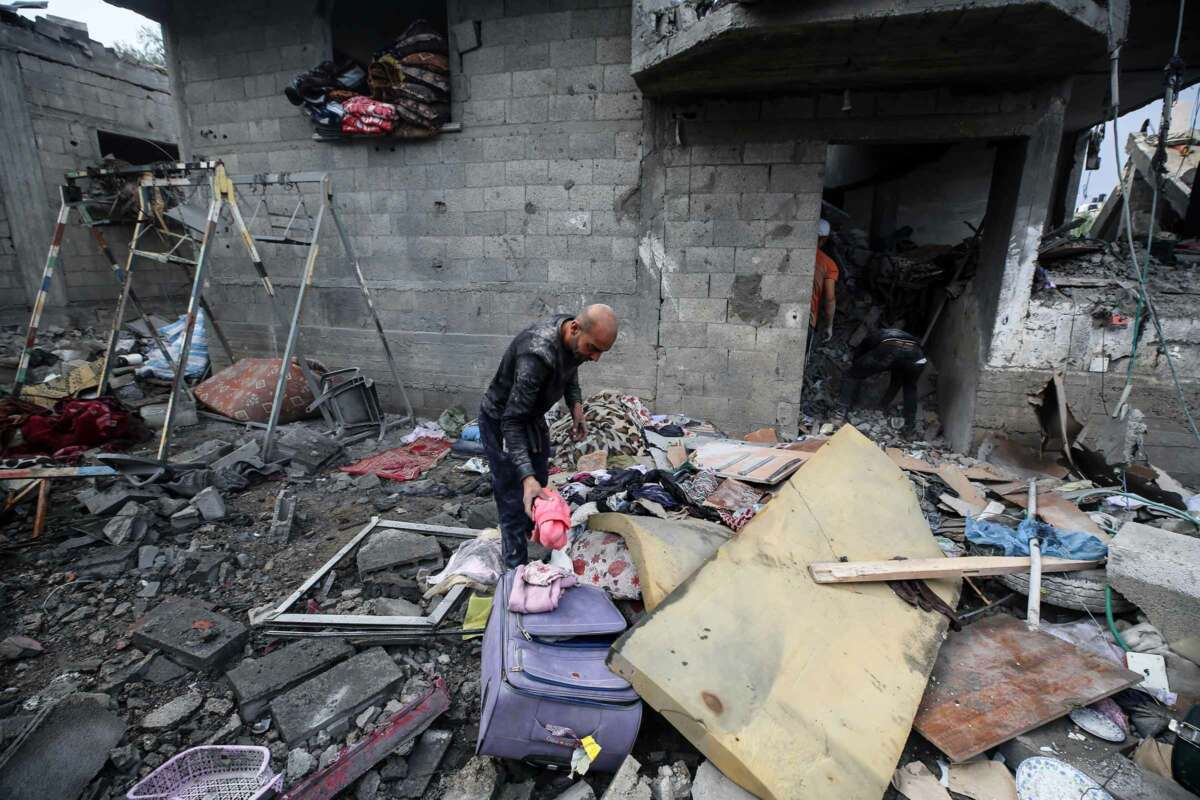Did you know that Truthout is a nonprofit and independently funded by readers like you? If you value what we do, please support our work with a donation.
The Israeli military on Tuesday expanded its ground assault to refugee camps in central Gaza, forcing displaced people to flee in terror from an area that was once considered a relative safe zone as the rest of the strip came under near-constant bombardment.
Over the weekend, U.S.-armed Israeli forces pummeled central Gaza with airstrikes, reducing the Maghazi refugee camp to ruins and killing more than 100 people in one of the deadliest bombings since the devastating military campaign began in early October. Many more people are believed to be trapped under the rubble in Maghazi.
The Associated Press reported Tuesday that the Israeli military has “ordered residents to evacuate a belt of territory the width of central Gaza, urging them to move to nearby Deir al-Balah.” According to the United Nations, more than 61,000 people were sheltering in the area Israel is now targeting.
“Residents of central Gaza described shelling and airstrikes shaking the Nuseirat, Maghazi, and Bureij camps,” AP reported. “The built-up towns hold Palestinians driven from their homes in what is now Israel during the 1948 war, along with their descendants.”
One mother of four told Middle East Eye that she “started crying hysterically” when she heard the news that Israel had deemed areas of central Gaza battle zones and issued evacuation orders.
“Where would I go with these children?” she asked. “We do not have any relatives in Deir al-Balah.”
Seif Magango, a spokesperson for the U.N. Human Rights Office, said in a statement Tuesday that he is “gravely concerned about the continued bombardment of Middle Gaza by Israeli forces.”
“It is particularly concerning that this latest intense bombardment comes after Israeli forces ordered residents from the south of Wadi Gaza to move to Middle Gaza and Tal al-Sultan in Rafah,” Magango continued. “Israeli forces must take all measures available to protect civilians. Warnings and evacuation orders do not absolve them of the full range of their international humanitarian law obligations.”
Israel’s expansion of its ground assault came days after the United Nations Security Council (UNSC) approved a binding resolution calling for an increase in humanitarian aid to Gaza and urgent steps to “create the conditions for a sustainable cessation of hostilities.”
An initial draft of the resolution called for an “urgent and sustainable cessation of hostilities,” but the U.S. — which has veto power at the UNSC — watered the measure down. The U.S. ultimately abstained from the final vote, allowing it to pass.
Passage of the U.N. resolution has done nothing to deter the Israel Defense Forces (IDF) from intensifying their attacks on areas packed with civilians, many of whom have been displaced multiple times in less than three months.
More than 90% of Gaza’s population of 2.3 million has been forced to flee their homes due to Israel’s airstrikes and ground invasion, which began following a deadly Hamas-led attack on southern Israel. Around 60% of Gaza’s housing infrastructure has been destroyed or damaged by Israeli forces, leaving displaced people with nothing to return to — if they’re able to return at all.
Israeli Prime Minister Benjamin Netanyahu reportedly suggested Monday that he’s looking for countries to “absorb” displaced Gazans, intensifying fears that a goal of the ongoing assault on Gaza is the permanent removal of the Palestinian population.
The U.S., meanwhile, has not wavered in its unconditional military support for Israel, even as the country’s government has defied its meager calls for the protection of Gaza civilians. The Biden administration has reportedly delivered more than 10,000 tons of military equipment to Israel since October, including 2,000-pound bombs that Israel has dropped on densely populated areas.
In a social media post on Tuesday, U.S. Rep. Lloyd Doggett (D-Texas) argued that the Biden administration’s “begging Netanyahu to safeguard civilians while sending him weapons and abstaining on even the most modest U.N. resolution has failed.”
“So long as Netanyahu faces no consequences,” Doggett added, “even more innocent civilians will face death and starvation.”
A terrifying moment. We appeal for your support.
In the last weeks, we have witnessed an authoritarian assault on communities in Minnesota and across the nation.
The need for truthful, grassroots reporting is urgent at this cataclysmic historical moment. Yet, Trump-aligned billionaires and other allies have taken over many legacy media outlets — the culmination of a decades-long campaign to place control of the narrative into the hands of the political right.
We refuse to let Trump’s blatant propaganda machine go unchecked. Untethered to corporate ownership or advertisers, Truthout remains fearless in our reporting and our determination to use journalism as a tool for justice.
But we need your help just to fund our basic expenses. Over 80 percent of Truthout’s funding comes from small individual donations from our community of readers, and over a third of our total budget is supported by recurring monthly donors.
Truthout has launched a fundraiser to add 460 new monthly donors in the next 8 days. Whether you can make a small monthly donation or a larger one-time gift, Truthout only works with your support.
